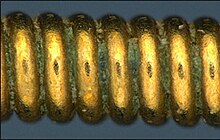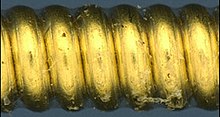String corrosion and prevention
All metal strings are susceptible to oxidation and corrosion. Wound strings commonly use metals such as brass or bronze in their winding. These two metals are very vulnerable to corrosion. The sebaceous gland in the player's skin produces oils that can be acidic. The oils, salts, and moisture from the player's fingers are the largest source of corrosion. The composition of the oil and the oxygen in the air also helps to oxidize and corrode the strings. In steel strings the oxygen reacts with the tin in the steel and it creates the rust. As a result, the string loses its brilliance over time. Water, another by-product of oxidation, increases the potential acid corrosion in oils. Wound strings such as bronze acoustic strings, are very difficult to keep fresh sounding due to the lack of corrosion resistance. To help solve the corrosion problem strings are either metal plated or polymer coated. The polymer coating is claimed to reduce finger squeak and fret wear, and has better tuning capability. Some companies sell lubricating oils that slow down the oxidation process, increasing the string's life-span. These special lubricating oils are applied to the strings as a barrier to the air, to help slow the oxidation process.
Coating and plating
Some common types of metal plating on strings include tin, nickel, gold, and silver. Some metals such as gold and silver give the strings a different sound. When coated with a polymer (polytetrafluorouthylene) Teflon is the most commonly used. Teflon is resistant to many corrosive agents such as: chlorine, acetic acid, sulfuric acid, and hydrochloric acid. On the microscopic level Teflon has very tightly packed polymeric chains, and these tightly packed chains create a slippery surface that not only helps keep the oil from the player's hands off the strings but makes them smooth to play as well. Ethylene tetrafluorothylene (ETFE) is another polymer that is sometimes used to coat strings. It is abrasion and cut resistant and has many characteristics similar to Teflon.
Boiling strings (guitar and bass)
Some musicians boil guitar or bass strings to rejuvenate them. The high temperature of the boiling water helps free the strings of oil, salt, and grime from the players hands. When a string is played, very small metal shavings from fret wear may break off and lodge between the windings of the strings. Heating the strings can expand these particles and separate them from the windings. Some players use deionized water to boil strings, believing that mineral deposits in tap water may aid corrosion of the string core. After boiling, strings may have less elasticity and be more brittle, depending on the quality of the alloys involved. Putting the strings through a cycle in the dishwasher has also been known to work.


Niciun comentariu:
Trimiteți un comentariu